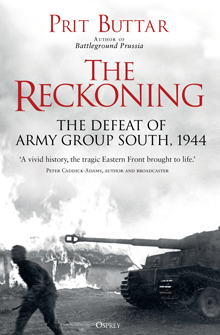The Reckoning is an engaging contribution to scholarship on the Second World War. Pivotally, Buttar rejects the Western-centric view of the ‘Eastern Front’ being a sub-event to the exploits of the Allies in seeking control over the West. Indeed, Buttar insists that the struggle between the USSR and Germany was entirely unalike that of the Allied struggle; it was an existential conflict. These two nations with directly opposed political ideologies fought not only for military victory, but ofttimes the annihilation of the other’s political thought. The result was cataclysmic.
Buttar’s central argument is that 1944 was the decisive year in which hostilities between the Red Army and the Wehrmacht climaxed. Overall, The Reckoning: The Defeat of Army Group South, 1944 is a convincing entry-level text for those interested in the ‘specific’ details and chronology of events on the Eastern Front. The Reckoning contributes to a more traditional military history, in the sense that Buttar guides the reader sequentially down into the trenches, into the bunkers of the Soviet and Nazi command, and accordingly across boundaries. The real strength of Buttar’s approach to the conflict on the Eastern Front is that he does not tell the story of how the Wehrmacht lost, rather how the Red Army learned to win.
Buttar’s extensive use of the memoirs of both Russian and German soldiers, as well as partisans behind German lines in the final year of warfare, masterfully bring the events of 1944 to life. In doing so, Buttar can dichotomise the tangible events of the conflict from those wider influencing forces in operation to better understand how the Red Army was triumphant. The comprehensive chapter on Crimea is a perfect example of this, where we see Buttar move towards an amalgamated military, social and political history of the region. The Crimea was a crucial site of warfare based on ideology. For some Nazi High Command, it was the inherited home of the Gothic and thereby the natural site for expansion of the Volksgemeinschaft (i.e., ideological German people’s community composed of the Aryan race). Likewise, Buttar explains Stalin’s attempts to Russify the Crimea. In highlighting these kinds of ideological motivations, Buttar skilfully structures them into a narrative that insists these ideological tensions drastically drove forward events on the Eastern Front. Aligned with this, Buttar refers to memoirs of the senior Wehrmacht who insisted they were unaware of, even opposed to, the Einsatzgruppen’s violent annihilation of European Jewry. Buttar refutes this with reference to the massacre of Jews in Simferopol – conveniently disguised a tactful measure that was “essential” to avoid famine.
The Reckoning offers a refined history of conflict on the Eastern Front, and the sheer detail in which Buttar does so deserves much recognition. To this end, I highlight his primary evidence – which work to remove any temporal disconnect between the contemporary reader with the benefit of a ‘backwards facing lens’, and soldiers on both sides. Buttar situates the reader inside the minds of soldiers; we garner insight into the hopes, fears, and motivations of varying personnel (in terms of rank and file). For example, an account by Albert Speer in Berlin reveals how by 1944 Hitler was rent with “spells of mental torpor” and “caustic and irritable”. Then, we read accounts by ‘ordinary’ soldiers. For example, Soviet gunman Grigorevich accounts for their brutalisation and describes finding “a heap” of Soviet offers relentlessly shot at by the retreating Wehrmacht. This combines to produce a highly detailed account of multiple Soviet victories in 1944.
The Reckoning deposits militaristic strategy within the context of intricately opposing political dogmas. It is this tactful style that enables us to appreciate how the Red Army defeated Army Group South in 1944, rather than why the Wehrmacht lost; to which Buttar highlights Soviet industrial prowess, revenge, and robust ideological motivation to defend the Soviet way of life.
The Reckoning: The Defeat of Army Group South, 1944, by Prit Buttar is available now and published by Osprey.







